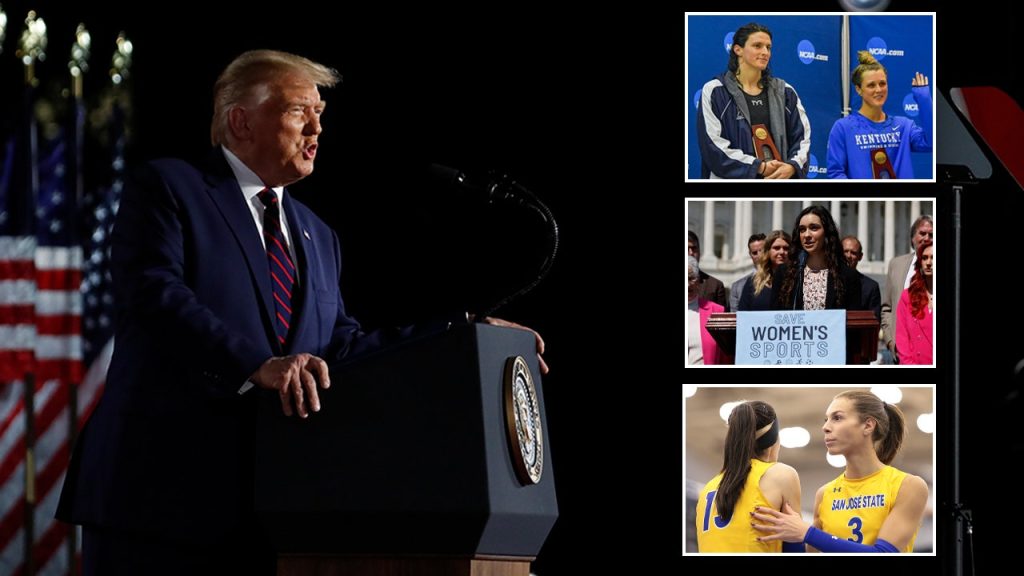The 2024 presidential election saw a potent campaign slogan resonate deeply with the American public: “Kamala is for they/them, Donald Trump is for you.” This simple yet effective messaging, heavily promoted during major sporting events, encapsulated a central cultural battleground: the inclusion of transgender athletes in women’s sports. The Trump campaign strategically linked Vice President Kamala Harris with support for transgender inclusion, a stance perceived by many as detrimental to the fairness and safety of women’s sports. This tactic, coupled with visuals of transgender individuals in designer clothing juxtaposed with Harris’ past legislative support for trans athletes competing in women’s sports, proved remarkably effective in swaying public opinion. The Trump campaign’s promise to protect women and girls by barring biological males from women’s sports resonated strongly with a significant portion of the electorate, particularly moderate voters, as revealed by exit polls.
The issue of transgender athletes in women’s sports became a pivotal factor in the election, propelled by a growing grassroots movement fueled by women’s rights groups and female athletes concerned about fairness and safety. The Trump campaign capitalized on this burgeoning movement, highlighting his pledge to ban trans athletes from competing against women at virtually every campaign rally in the final month. This focus tapped into a deep-seated concern among many voters, particularly women, who felt their concerns were being ignored by the current administration. Organizations like the International Council on Women’s Sports (ICONS) amplified these voices, advocating for the protection of female athletes and engaging in legal battles to challenge trans inclusion policies. While many advocates wished the issue wasn’t politicized, it undeniably played a significant role in Trump’s victory.
The election results demonstrated a shift in the political landscape, particularly among young college-educated women, a demographic previously favoring Democrats. Biden’s substantial lead among young women in 2020 dwindled considerably in the 2024 election, attributed in part to the trans athlete debate. This shift suggests that the issue resonated beyond traditional Republican voters and tapped into broader concerns about fairness and equality in sports. The debate also exposed fissures within the Democratic Party, with some members expressing reservations about the party’s platform on trans inclusion. The divide highlighted the challenge faced by Democrats in balancing support for transgender rights with the concerns of female athletes.
The controversy surrounding San Jose State University volleyball player Blaire Fleming, a transgender athlete, further fueled the national conversation. Trump’s public comments on Fleming, and the subsequent fallout, brought the issue into sharp focus. The incident, amplified by media coverage and campaign rhetoric, became emblematic of the broader debate. The experience of Fleming’s teammate, Brooke Slusser, who alleged she was traumatized by being forced to share spaces with a biological male, personalized the issue for many voters. Simultaneously, the University of Nevada, Reno women’s volleyball team’s near-forfeit against San Jose State due to Fleming’s presence highlighted the deep divisions and strong emotions surrounding the issue. This incident, unfolding in a crucial swing state, underscored the political potency of the trans athlete debate.
The rise of anti-trans merchandise and the emergence of brands like XX-XY Athletics, founded by former gymnast Jennifer Sey, signal the commercialization of the movement. Sey’s brand, which focuses on “standing up for the protection of women’s sports,” has seen substantial success despite facing censorship and criticism. The brand’s NIL program, “GXME CHXNGERs,” offers financial incentives to female athletes who advocate against trans inclusion in sports, further solidifying the movement’s foothold in the athletic world. The LPGA’s decision to ban post-puberty biological males from women’s professional golf competitions further demonstrates the growing acceptance of such policies, despite earlier fears of backlash. The smooth acceptance of the LPGA’s decision suggests that resistance to trans inclusion in women’s sports is gaining broader acceptance.
Despite attempts to downplay the issue as “remote,” the prevalence of trans inclusion debates at the high school level, court battles over state laws, and international scrutiny underscore its significance. From high school volleyball teams forfeiting matches to protests at school board meetings, the issue is deeply embedded in local communities across the country. Court cases challenging state laws restricting trans athletes in sports highlight the ongoing legal battles, while a UN report documenting the displacement of female athletes from podium finishes due to trans inclusion adds an international dimension. The upcoming 2028 Olympics in the US, during Trump’s potential second term, further emphasizes the global implications of this issue. With Trump’s return to office and his campaign promise to protect women’s sports, the stage is set for further executive action and potential legal challenges, ensuring the debate will continue to be a defining characteristic of the American political and cultural landscape.

